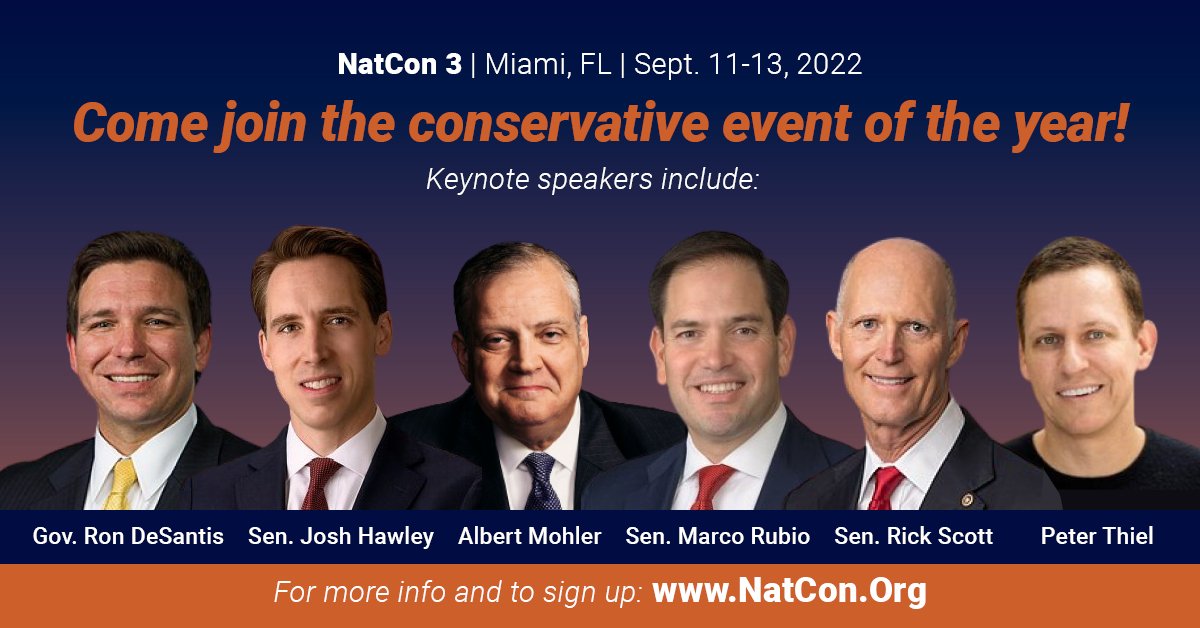I attended the third National Conservativism conference in Miami and was pleasantly surprised by what I heard. I went skeptical: “nationalism” left a bad taste in my mouth, and I was sure I would find rabid Donald Trump supporters, QAnon types, or people who despised those from other countries. None of my preconceptions were true. Instead, I discovered a community of thoughtful conservatives looking to push back against a progressive tidal wave submerging the best of American culture.
The most precise way to analyze National Conservatism is through their “Statement of Principles.” Published in June of 2022, these ideas form the framework of an umbrella movement. While some figures in NatCon gravitate more towards economic policy, immigration concerns, or moral arguments, they all find a home beneath the umbrella of shared principles.
A second place to look to understand National Conservatism is the NatCon Youtube channel, where talks from all three NatCon conferences stream. At NatCon3, two moments occurred that merit consideration. First, Kevin Roberts, president of the Heritage Foundation, announced, “We [Heritage] are not asking you to join our movement; we are here to join yours.” Roberts leant the institutional support of the Heritage Foundation, the flagship think tank of the conservative movement, to National Conservatism. It was a significant moment for a group trying to build a new conservative consensus.
The second moment occurred in the final keynote address, delivered by Al Mohler, president of the Southern Baptist Theological Seminary. Mohler was an anomaly at NatCon; as a Southern Baptist denominational statesman, he stood out in a crowd of Catholics, Jews, and “Magisterial Protestants” discussing the open use of legislative power. Mohler said in his address that National Conservatism is “nothing new.” It is instead a current home for conservative principles that have been at the heart of the movement since the 1950s.
Mohler’s statement helps to conceptualize National Conservatism. Rather than a clearly defined set of policy positions, NatCon is a consensus movement trying to build momentum around several key ideas. Below are a few ideas from the Statement of Principles, followed by an explanation.

The “national” part of National Conservatism is a positive vision of a world composed of distinct, sovereign nations. As such, it opposes both globalization and imperialism. National Conservatism contends that the highest human community is not the “international community” represented by the United Nations, the International Monetary Fund, or the World Economic Forum, but instead the nation itself. Each nation has self-defined interests, and politicians elected by their people seek their national interests.
The “conservatism” part of National Conservatism looks to the necessity of locating government within a broader reality. God, religion, and natural law are all principles NatCon embraces, arguing that the nation must first have a religious foundation from which public law is derived. NatConn seeks to conserve the tradition of Christianity and freedom of religion within the framework of our American experiment, as it was more originally understood. It’s important to note that National Conservatism is not attempting to force conversions on any religious groups but instead asserts that for a country to rule itself, there must be an agreement on the highest good. That highest good, Thomas Aquinas, once noted, “all men call God.” National Conservatism advocates a broad consensus Protestantism for America since America has been a Protestant nation in practice. That foundational agreement on the highest good creates the space for national self-government on secondary concerns of policy.
A third area of interest for National Conservatism might be called “higher-order goods.” While NatCon affirms the goods of the free market and the efficiency with which it operates, National Conservatism recognizes that elements of human life are more important than material prosperity. The chief of these is the family. National Conservatives argue that the current economic incentives for both parents working outside the home disincentivize marriage in some cases. Social science research is unanimous in finding that marriage is the best situation for raising children. The best schools in the world cannot compensate for parents who prioritize careers over active engagement in their children’s lives. In forming a NatCon plan, prioritizing the family takes a preeminent place.
Russell Kirk defined conservatism as an orientation towards conserving and transmitting a culture rather than a source for policy plans. National Conservatism picks up the conversation from Kirk’s “The Conservative Mind.” It adds the possibility of using the administrative state and legislative responsibility to shape a society in accordance with specific principles. In contrast to progressivism, the principles by which NatCon seeks to shape the nation derive from our past and our nature as human beings. The movement is building, and work remains to build a functioning political position leading to elections and implementing law. It is exciting to see energy on the conservative side; NatCon might be the conservatism needed for our moment.
Josh Herring is the Dean of Classical Education for Thales Academy Apex JH/HS. He hosts a podcast called The Optimistic Curmudgeon, and tweets at @TheOptimisticC3. In his spare time, he is reading and writing towards a PhD in Humanities from Faulkner University.